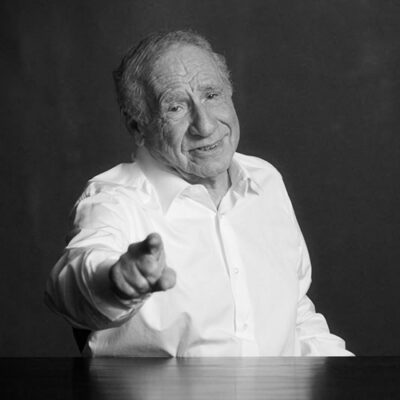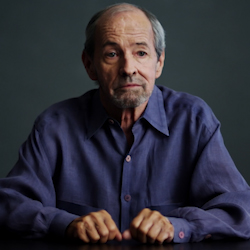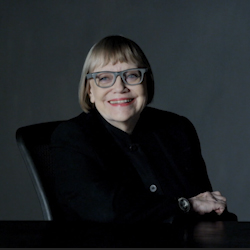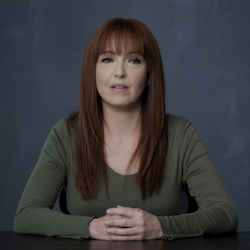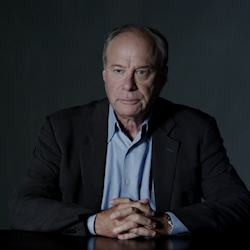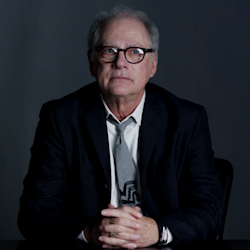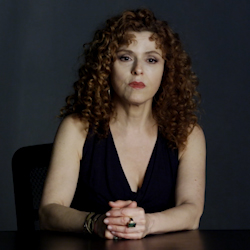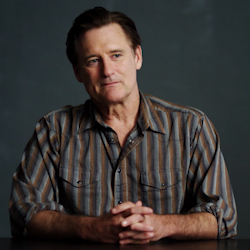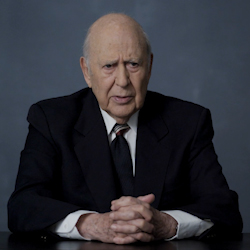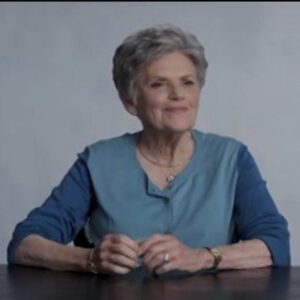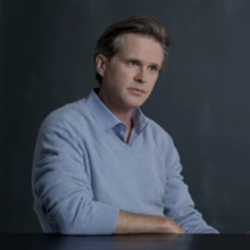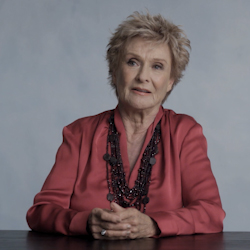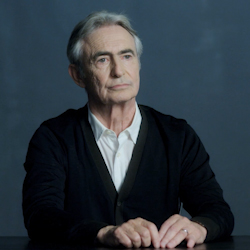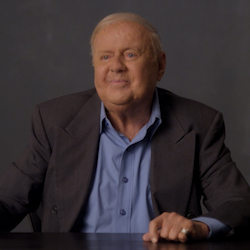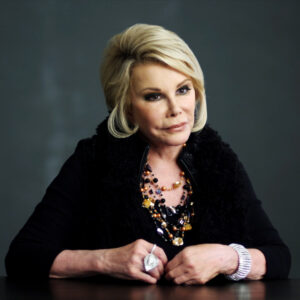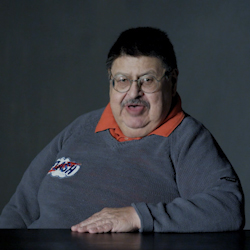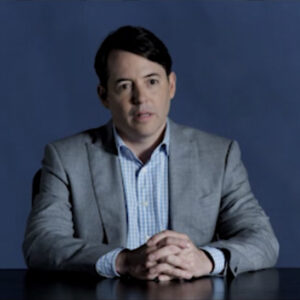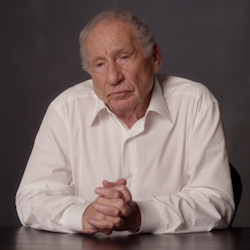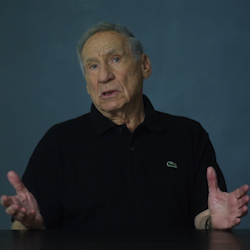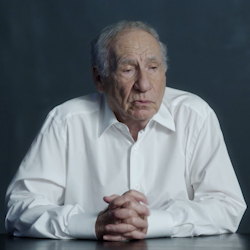Interviewer: OK, Jay, tell us when you first met Mel.
Jay Kanter: I was working in New York for a theatrical agency and I used to cover a lot of television shows. And Mel was a writer on the Sid Caesar’s Your Show of Shows and that’s kind of when I first met him. It was in the nineteen fifties, early fifties.
Interviewer: What do you remember about him then?
Jay Kanter: Very funny man. Very, very inventive. Full of life. Yeah.
Interviewer: And that was more like a you just sort of run into him sort of thing.
Jay Kanter: More or less, yes.
Interviewer: So was it not until you were at Fox that you became closer?
Jay Kanter: Yes. When I when I became an executive at Fox in the 1970s, Mel was already at the studio and I got to know him quite well. Along with a lot of other producers and directors who were working on the third floor of the executive building.
Interviewer: So what was your what was your executive role at the studio at the time?
Jay Kanter: What was my what?
Interviewer: What was your role at the studio?
Jay Kanter: I was vice president in charge of production.
Interviewer: OK. So then you were instrumental in helping to greenlight his productions? Right.
Jay Kanter: No, that was really left up to Alan Ladd. But I worked very closely with Ladd. We used to work together in an independent company in England. And I knew him. I knew Laddy since he was a very, very young man.
Interviewer: So of all of the other producers and all of the other productions that were going on at the studio at the time.
Jay Kanter: Right.
Interviewer: This had to be a different animal with Mel right?
Jay Kanter: Yes, yes. Yeah. Mel provided an awful lot with the comedy, but there were other, you know, very talented people like Paul Mazursky there and a lot of good people.
Interviewer: Would you say that? But the day to day business of doing a Mel Brooks movie on the lot was similar to all the other productions or.
Speaker Well no, it was always full of surprises. You’d walk on the set and there was an upbeat feeling going on. There was a lot of laughter. Mel worked very closely with the cast. And he also was very, very good about when he finished a movie. With a comedy, you really don’t get the feel of it if you’re watching it by yourself or if you’re watching it in a screening room with two or three other people, you have to have an audience. And Mel used to bring a lot of people into those screening rooms, and that’s how he got a good feeling as to what worked, what didn’t work, where the laughs were, what jokes to take out, what jokes to put back in. He was good at that.
Interviewer: Now he would bring in you should repeat this back if this was true. He would bring in not just friends and other comedians, but he would, in fact, bring in like secretaries and.
Jay Kanter: Oh, yes. Yeah. He would bring in. He would bring in a fresh audience. Yeah.
Jay Kanter: Made up of?
Jay Kanter: Most people around the studio. And very often there were a few friends there at each screening, but it was mainly outside people that had no contact with the making of the picture at all. And weren’t really aware of what the script was. And so he could get a good feeling and a good reaction from kind of a fresh audience.
Interviewer: How how did it work when when a movie didn’t click with the public? You know, some of the films didn’t. I mean.
Jay Kanter: Well, actually. Very few didn’t. There was I can’t really remember, but there was one instance where we previewed a movie, I think we were somewhere in Chicago and the preview didn’t go too well. And he was visibly upset. But it happens so rarely because I think almost every one of them basically did very well.
Interviewer: Yeah, it’s a different obviously it’s a different business now. The profit, the profit. It wasn’t so dependent on having the weekend to, you know, by Friday afternoon they know what they’re.
Jay Kanter: No. Well, at that time, we used to release pictures in a bit of a different way. You wouldn’t go out with, you know, it’s a huge, huge number of theaters. You’d go out with a good number of theaters. And sometimes you build good word of mouth and you could start to build on that. And with Mel’s pictures, he did always get very good word of mouth and that kept the audiences coming and kept the theater owners happy.
Interviewer: Was there? Do you remember a time during production of one of the films or preproduction where he wanted to do something and you guys upstairs had to say no?
Jay Kanter: Very, very rarely. He basically got his way because frankly, he was always not always right. But most of the time.
Interviewer: Do you recall a time when we’re not giving you the money for that or anything?
Jay Kanter: No, I can’t. I can’t.
Interviewer: How did how did the lunches start?
Jay Kanter: Oh, the lunches that we have on Friday? I don’t know. It started a number of years ago. We used to go to a restaurant called Orso’s, which we would meet on a Friday afternoon. We had our own table. Mel always picked up the check. And there was always a great deal of laughter coming from that table, because between Paul and Mel and occasionally some of us chiming. I, I basically provided the laughter. They provided the entertainment.
Interviewer: What do you think those lunches mean to Mel?
Jay Kanter: They seem to mean a lot to. He enjoys them, he he enjoys our company. I think he feels he’s among friends and and he’s very protective about who comes to the lunches. If you want to bring somebody in, you’ve got to get his permission. It’s mainly, no.
Interviewer: He sort of runs the show.
Jay Kanter: He runs the show.
Interviewer: Has permission been denied and granted?
Jay Kanter: Yeah, there were people he doesn’t invite. Strangely enough, his best friend. He’s never invited Carl Reiner.
Interviewer: Yeah. You know, I was wondering about that. Why is that?
Jay Kanter: I don’t know. I mean, he he sees Carl practically every evening and they’ve been best friends for an eternity.
Interviewer: What do you what you would say his places and not even so much comedy, but the entertainment?
Jay Kanter: Pardon?
Interviewer: What would you say his place is in sort of entertainment history or comedy?
Jay Kanter: Well, he’s unique. He’s he’s something special. He’s a writer. He’s a director. He’s an entertainer. He’s an actor. He’s very recognizable to people. At our Friday lunch, where are we now we’ve moved to a restaurant on Cannon Drive and we sit outside. And very often those tour buses drive by. They all seem to recognize him and he waves and takes his hat off. And he responds, well, I think it’s now on the tour circuit.
Interviewer: Have you guys thought of moving in to indoors or you’re fine?
Jay Kanter: No. Oh, on rainy days. We move indoors.
Interviewer: How many years have you been doing those lunches?
Jay Kanter: Pardon?
Interviewer: How many years have you been doing the lunches?
Jay Kanter: I don’t know, ten, twelve, something like that.
Interviewer: Did. Did he stop for a while when Anne passed away?
Jay Kanter: No. He he he never stopped. There was a period of time when. If he was out of the city for a while or if he was or when He did a show on Broadway we would postpone it until he got back. But he pretty much he’s there all the time.
Interviewer: Is there a particular a favorite story or anecdote you have about the lunches or Mel in general?
Jay Kanter: No, there there is a no, he tells wonderful stories. And there is one story that always breaks me up. And it’s when he said he was writing a show for he was writing on the Sid Caesar show and they were going to do a show outside of New York and Chicago. And all the writers would work around the table, and at the time there was a lot of smoking going on. And Mel said, I don’t know whether he was getting tired or whatever, but he said, I want to, I want to go outside and get some air. And Sid Caesar’s says, said it’s air you want? And Mel said yes. And said who was very strong, opened the window, picked Mel up and held him out of this hotel window. And but the way he describes it, it it always makes me laugh.
Interviewer: Anything I’m forgetting that you’d like to say?
Jay Kanter: No. He’s the only way I can describe him is he’s a national treasure.
Interviewer: That’s pretty good.
Jay Kanter: Yeah.
Interviewer: It’s hard to beat. Thank you so much.
Jay Kanter: Thank you.
Interviewer: I think we’re good.
Interviewer: Thank you so much.
Jay Kanter: It’s my pleasure. I hope. I hope it was some.

